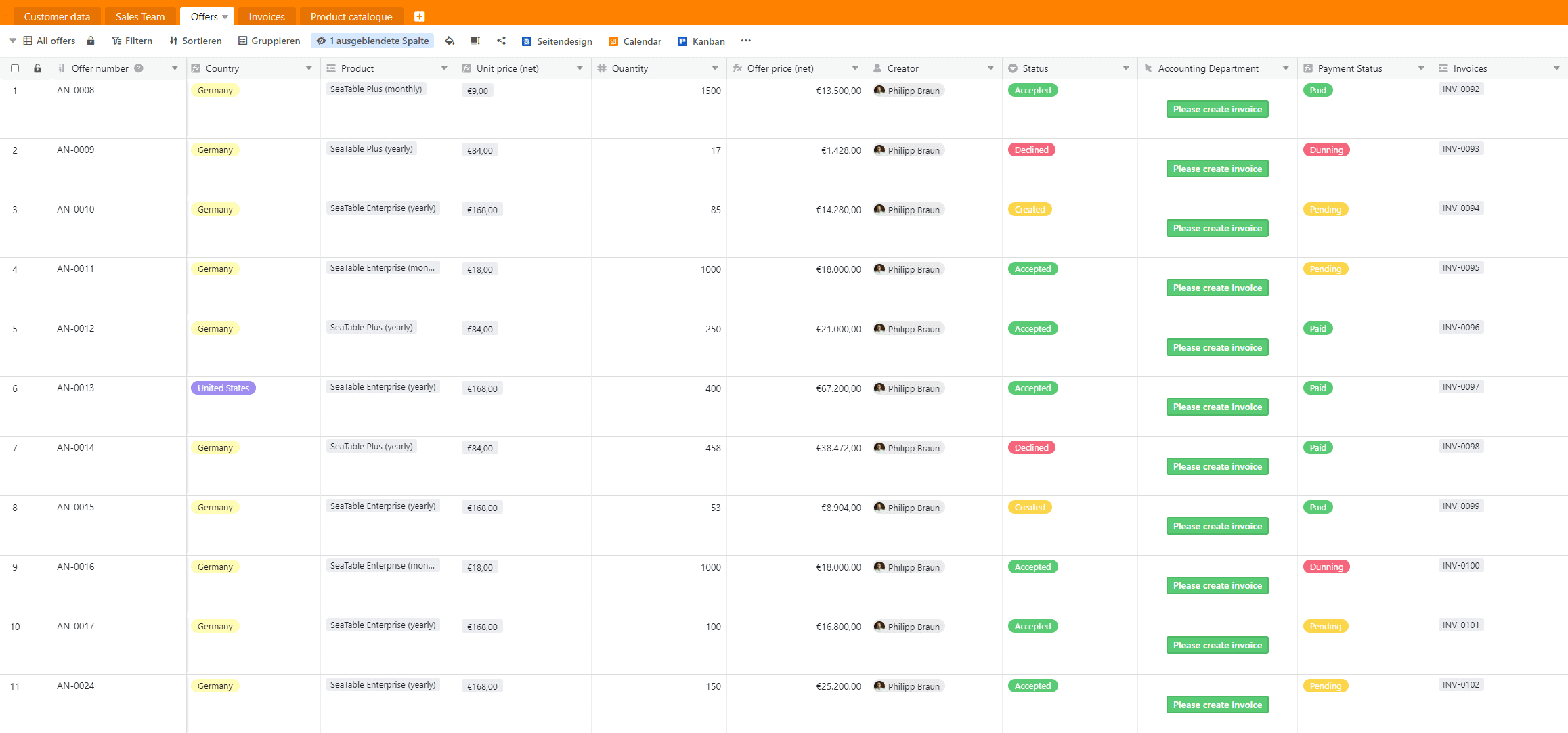Die Umstände im Jahr 2020 haben die Art und Weise, wie in Unternehmen gearbeitet wird, erheblich verändert. Gemäß einer kürzlich durchgeführten Gallup-Umfrage möchten 9 von 10 Remote-Arbeitnehmern diese Arbeitsweise in gewissem Umfang beibehalten.
Für Vertriebsmitarbeiter, die nicht an den Remote-Verkauf gewöhnt sind, kann sich dies jedoch als Herausforderung erweisen, da dieser sich erheblich von dem Verkauf von Mensch zu Mensch oder dem traditionellen Verkauf unterscheidet. Die Remote-Arbeit kann dabei jedoch viele Vorteile mit sich bringen, vorausgesetzt sie wird richtig praktiziert. Sie kann den Verkaufsprozess verbessern, die Produktivität Ihres Teams steigern und Ihre Vertriebspipeline füllen, ohne dass Sie Ihren Schreibtisch verlassen müssen.
In diesem Artikel zeigen wir Ihnen, wie ein Remote Sales Team seine Marketing- und Verkaufsprozesse optimal verwalten und überwachen kann.
Leistungsstarke Strategien zur Steigerung der Effizienz von Remote-Verkaufsteams
Aufgrund der immer weniger vorhandenen persönlichen Kontakte ist es für das Vertriebsteam von entscheidender Bedeutung, in einer Remote-Arbeitsumgebung in Verbindung zu bleiben und produktiv zu arbeiten. Im Folgenden finden Sie einige bewährte Strategien und Praktiken, die Sie anwenden können, um die Leistung und Effizienz Ihres Remote-Verkaufsteams zu steigern.

Setzen Sie klare Ziele und Erwartungen
Wenn die Mitarbeiter über verschiedene Standorte verstreut sind, sollte ein Vertriebsleiter die Vertriebsziele und -prozesse kommunizieren, damit die Vertriebsmitarbeiter stets über ihre tägliche Arbeit und die Teamziele im Bilde sind.
Durch die Festlegung klarer Erwartungen erhalten die Außendienstmitarbeiter verschiedene Vorgaben, an denen sie sich orientieren können, z. B. Verkaufsziele, spezifische Online-Verfahren zur Ermittlung von Leads, Vorgehensweisen bei der Kaltakquise von potenziellen Kunden, Methoden zum Abschluss von Geschäften und Verfahren für den Fall, dass Probleme auftreten. Gemäß einer Gallup-Umfrage unter deutschen Arbeitnehmern ermutigen derartige Praktiken Remote-Arbeitskräfte dazu, zusätzliche Initiative zu ergreifen und bessere Leistungen zu erbringen.
Eine weitere Möglichkeit stellt die Durchführung von Feedbackgesprächen mit den Vertriebsmitarbeitern dar, um ihre Leistung zu bewerten, Verbesserungs-möglichkeiten zu ermitteln und einen Entwicklungsplan zu erstellen. Organisieren Sie zudem häufig Besprechungen per Videokonferenz, um sicherzustellen, dass Ihre Vertriebsabteilung informiert und verbunden bleibt.
Investieren Sie in die richtigen Tools für Ihr Remote Team
Mittlerweile wurden mehrere digitale Tools entwickelt, die Remote Sales Teams dabei helfen, ihre Daten zu optimieren und zusätzlich die Produktivität und Motivation zu steigern. Die Investition in derartige Tools kann Vertrieblern dabei helfen, komplexe oder sich wiederholende Aufgaben zu automatisieren, um den Fokus auf wichtigere Aufgaben legen zu können.
Ein effizientes CRM-System ist für Remote Teams wichtig, um einen Überblick über ihre aktuellen Vertriebsaktivitäten zu erhalten und den Vertriebsprozess zu visualisieren. Einige der besten Remote CRMs sind Salesforce, Pipedrive und HubSpot.
Projektmanagement-Tools ermöglichen es Ihren Mitarbeitern, Projekte im Blick zu behalten und unabhängig von ihrem Standort informiert zu bleiben. Trello und Basecamp stellen hier gute Beispiele für geeignete Projektmanagementsoftware dar.
Die Zusammenarbeit über verschiedene geografische Regionen und Zeitzonen hinweg ist nicht einfach. Google Workspace, Miro und Podio sind einige der besten Kollaborations-Tools für Vertriebsmitarbeiter.
SeaTable ist eine weitere erstklassige kollaborative Anwendung für das Informationsmanagement. Die No-Code-Anwendung verfügt über Lösungen für Marketing, Vertrieb und Projektmanagement, die Remote Sales Teams bei der Erfassung, Strukturierung und Auswertung verschiedener Arten von Informationen unterstützen.

Remote Sales Teams sollten auch in ein virtuelles privates Netzwerk (VPN) investieren, um zusätzliche Sicherheit, Zugänglichkeit und Kontrolle zu gewährleisten. Die Mitarbeiter können sogar VPNs auf ihrem Android-Gerät oder iPhone implementieren, um ihre Verkaufsvorgänge von überall aus zu überwachen, ohne Kompromisse bei der Qualität eingehen zu müssen.
Verwendung von KPIs und Erfolgskennzahlen zur Messung der Vertriebsergebnisse
Wenn Sie Ihren Verkaufsprozess im Auge behalten, erhalten Sie eine Vorstellung davon, was funktioniert und was nicht. Leistungsindikatoren zeigen, ob jedes Teammitglied mit seinen zugewiesenen Aufgaben auf dem richtigen Weg ist.
Vertriebsteams können ihre Strategien anpassen, um mehr Erfolg für ihr Unternehmen zu erzielen. Remote Teams sollten darüber hinaus Berichte weiterleiten, um festzustellen, ob potenzielle Kunden an einem bestimmten Punkt in der Pipeline hängen geblieben sind.
Sie sollten sich auch nach Berichten über Verkaufsziele erkundigen, um zu sehen, ob die Vertriebsmitarbeiter ihre Ziele erreichen und die erwarteten Leistungen erbringen. Anhand von Berichten über die Gewinnrate kann das Vertriebsteam auch den ROI pro Lead ermitteln, da es die Anzahl der Geschäfte sieht, die über alle potenziellen Kunden hinweg gewonnen wurden.
Automatisieren Sie, wo immer es möglich ist
Jüngsten Vertriebsstatistiken zufolge verschwenden etwa 71 % der Vertriebsmitarbeiter den Großteil ihrer produktiven Zeit mit manuellen Eingaben. Mit Vertriebsautomatisierung und künstlicher Intelligenz wird die Arbeit von Vertriebsmitarbeitern erleichtert.
Die Automatisierung von Vertriebsprozessen hilft dem Remote Sales Team, bessere Leistungen zu erbringen, weil es im Workflow bleibt und seine wertvolle Zeit und Energie spart. Manager können ihr Vertriebsteam effektiv skalieren und entscheiden, wohin der Aufwand für optimale Ergebnisse gelenkt werden soll.

Das Hinterlassen von aufgezeichneten Nachrichten, das Ausfüllen von automatisierten täglichen Stand-up-Berichten und das automatische Versenden von Outreach- und Follow-up-E-Mails mithilfe von Tools kann den Vertriebsmitarbeitern helfen, mehr Zeit für die wichtigen Aufgaben zu haben, was zu einer höheren Produktivität führt.
Vertrauensvolle Beziehungen aufbauen
Wenn Mitarbeiter ihre Arbeitszeit nicht am selben Ort verbringen, dauert es natürlich länger, Vertrauen innerhalb eines Teams aufzubauen. Eine Möglichkeit ist die Förderung einer effektiven Teamarbeit unter den Vertriebsmitarbeitern durch Klärung der Rollen im Verkaufsprozess und regelmäßiges Feedback.
Mehr Kommunikation, um Missverständnisse zu vermeiden, ist ein weiterer guter Ansatz zum Aufbau vertrauensvoller Beziehungen in Remote Teams. Die Mitarbeiter sollten regelmäßig Updates senden, umgehend auf Nachrichten reagieren und zu wichtigen Zeiten jeden Tag erreichbar sein.
Das Remote Sales Team sollte auch interne Kommunikationsmittel einsetzen, um seine Kameradschaft auf eine neue Ebene zu heben. Derartige Tools fördern die Transparenz, indem sie Gespräche über Ebenen und Teams hinweg und den Wissensaustausch erleichtern.
Soziale Interaktionen in Remote Teams fördern
Es heißt, dass engagierte Mitarbeiter produktiver sind als solche mit wenig Kontakt zu anderen. Darüber hinaus ist es in einem remoten Arbeitsumfeld, in dem es fast keinen menschlichen Kontakt gibt, für die Mitarbeiter leicht, weniger sozial zu werden.
Zu diesem Zweck ist es wichtig, vorbeugende Maßnahmen zu ergreifen, um die Arbeitnehmer zu ermutigen, und Faktoren, die sie frustrieren, zu reduzieren. Darüber hinaus sollten Sie die Teammitglieder an gemeinsamen Erfolgen teilhaben lassen und ihnen Unterstützung anbieten, damit sie selbst große Erfolge erzielen können.

Eine gute Idee ist außerdem, Ihre Mitarbeiter zu ermutigen, auch Zeit außerhalb der Arbeit miteinander zu verbringen, oder ein Budget für teambildende Aktivitäten zur Verfügung zu stellen. Die bei diesen Aktivitäten stattfindenden Interaktionen können die Kommunikationsfähigkeiten verbessern und dabei helfen, Burnout zu vermeiden. Darüber hinaus können Sie Meetings produktiver machen und gute Teambeziehungen schaffen.
Fazit
Das Managen eines Remote Sales Teams erfordert viel Zeit, Mühe und Koordination. Wenn Sie die in diesem Artikel beschriebenen Praktiken befolgen, haben Sie gute Chancen, Ihr Geschäft auszubauen, mehr Umsatz zu machen und ein gutes Verhältnis zu Ihren Mitarbeitern aufzubauen.

